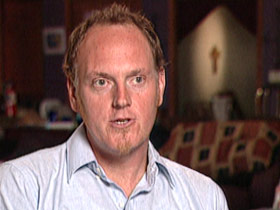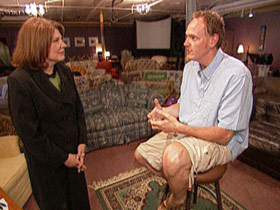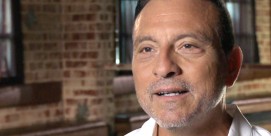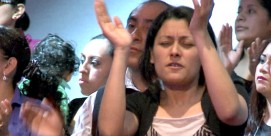In This Episode << SLIDE LEFT TO SEE ADDITIONAL SEGMENTS
Doug Pagitt Extended Interview
Read more of Kim Lawton’s interview about the emerging church with Doug Pagitt, pastor of Solomon’s Porch in Minneapolis and author of REIMAGINING SPIRITUAL FORMATION (Zondervan):
Why was the traditional way of “doing church” not resonating for you?

From my vantage point, at least, I think that we really are quite traditional in one sense, because I think what we’re doing is what those who have gone before us have also done. So while we’re not doing precisely the same model or the same feel or the same sound or the same look, we are trying to figure out in our day what Christianity would mean for us. And so in that way we’re much like the first century or the nineteenth century or the twenty-first century, so we’re trying to figure out what would it mean for us to live out the hopes and dreams and aspirations of God in the way of Jesus in our world, and trying to organize ourselves in a way that would make sense for us. You know, there’s people who tend to think that Christianity has one way of going and one way of functioning and one way of organizing itself, and that’s just simply not the case. From the very beginning Christianity has been a disparate religion; it doesn’t mandate one language, it doesn’t mandate one culture, it doesn’t mandate one way of meeting. We really are doing what’s very normal for Christians, and that’s to find ways for us to meet and to gather and to try to be shaped in the way of God in the setting that we find ourselves in. So it’s not like we looked at something and we said, “Well, those people are doing something wrong and we’re going to make it better.” We said we needed to do something that really is honest and representative of the lives that we’re currently living today. So we became, you know, an active part in the creation of the kind of church that we want to be in.
What are some of the characteristics that help you express Christianity today in this culture and time?
The hallmarks of our expression of Christianity, of course, aren’t stagnant either, right? So that’s kind of something changing. I’ll try to speak as honestly as I can, but that may change at some point as well. But for us, meeting in the round is kind of an important thing. Part of it has to do with how we understand our community and how we’re going to relate to one another. So to be face to face in our weekly meeting is an important thing. We’re trying to live lives that are open to one another, that are face to face, that are inclusive of other people’s lives in our pursuit with God. So meeting face to face is important. For it to be representative of our community and to come from us matters. So we write our own music, we create our own prayer, we do use a number of elements from the church throughout history. We’ll recite creeds, we will borrow prayers and invocations, we will use the scriptures quite regularly and frequently and in-depth. But we’re also trying to say what are the words that we would put around it? In some ways we’re trying to figure out how we would leave, you know, something of value to our own children’s children. So they will look back and ask what their great-grandparents did in the twenty-first century, back when things seemed easier, I’m sure, from their vantage point.
So to meet face to face, to create our own language, to create our own expression really matters to us. To have creativity and art and beauty matters. It’s more important for us to feel like we’re representing a beautiful expression of our life with God than it is to be right about everything. Some people hear that, and it just sounds like, “Well, that’s just going to go down the road of all kinds of trouble.” I guess it could, but what I am certain of is that churches who have tried to be right about everything have also gone down a road full of all kinds of trouble. So it’s not like were choosing a road of peace and a road of trouble; it seems that there’s trouble on both sides, and we would just as soon be careful about being a people of peace and of beauty and of goodness and not have to be right about everything, so there’s as much an attitude of sharing and of dialogue and of input and of the people who are here actually having a part to play in what we’re doing.
You know, for Protestants the notion of the priesthood of the believer was an important part of the Reformation of the fifteenth and sixteenth centuries, and it seems that in a lot of ways that goes by as an unfunded mandate for the church. We talk about it and never put any resources behind making it happen. We’re working really hard at trying to make the priesthood of the believer mean something not only in our Sunday gathering but throughout the course of what it means to be a church, and I’ll tell you that comes with a lot of cost, and it’s much more difficult than it is to just set aside a few people to make all the decisions and ask everyone else to fall into line.
Why is it more difficult?
It’s difficult to involve everyone in the life of a church because people think differently, and part of the beauty of a community is the diversity. We’re not all the same. We don’t think the same, we don’t vote the same, we don’t shop at the same stores, we don’t raise our children in the same way, we don’t come from the same families. So you bring all of this together into one meeting, and you say to people, “Well, what should we do?” And when the conversation shifts from what would I do, what would I like, to what would we do and what’s best for us, this becomes a different question, and now we have to put together the structures and the mechanisms to include as many people as possible in that, believing that all people have the spirit of God in them and can be led by God. So there’s no chance that one person gets to say. “Well, I have an education, or I have a level of experience, therefore I speak for God and you don’t.” I can say, “I speak for God and so do you.” So now we have to negotiate even that.
Fortunately, we’re in good company throughout the life of the church. Churches tried to figure this out in local congregations and across the world for centuries. But it’s a difficult thing because to move together means giving up something. You don’t get to move as quickly; you’re not able to make decisions as clean. We probably waste a lot of time and energy. But it’s really not a waste in my view because we’re doing something collectively, and we’re doing something together, and it seems that’s more in harmony with what God would have us to do. If God invites us to be co-creators with God in the life of the world, which I think God does, then to look at other people as co-creators with God is just what you do.
So we have to figure out how to organize ourselves, and some of that means running against the flow in what the church expects and what the people expect. One of the real struggles in involving people in the life of the church and feeling that they’re a part of it is that people don’t want that. There’s an awful lot of people who want to go to church and have a service provided for them; to be serviced in some way and to engage in a religious activity and then to go and hope that those people who run the religious service will be there again next week so that they can engage in it again. When you say to them, “No, you’re a part of this,” it changes their mindset. It’s like if someone were to go out to a restaurant and they were to sit down and they placed their order and the waiter said, “Well, get up and go into the kitchen and make your food then.” They think, “No, I’m at a restaurant. I come to these places because I don’t want to make my own food.” There are an awful lot of people who want to go to church because they don’t want to do their own spirituality. When they come, and we start saying to them, “No, this is a place where you take on greater responsibility for your spiritual life and for the spiritual lives of those around you,” it changes the relationship a little bit. We’ve had to work hard to renegotiate what it means to be a part of a community where your involvement is a necessity and isn’t just something to do if you’re sort of more involved than others, but it’s the baseline.
Is everyone qualified to do that? Are some people in a place where they shouldn’t be determining the spirituality of a group?
Qualification for involvement in other people’s spiritual life is a big deal. Not every opinion is equally valid, and that’s just simply the case. Some people just don’t know as much as others do. That’s what makes it work; you have to now determine whose opinion really does matter on a particular topic. I think you always have a leader. Anytime you have a group of people together, someone’s the leader. But it doesn’t have to be the same person all the time, leading on every topic and leading in the same way. Leadership can move. It can rotate, but someone’s always going to have leadership. That’s part of what give-and-take means. I’m the pastor of our community, but that doesn’t mean that I’m this most qualified on every topic and every subject. There may be a case in which someone is better qualified for that situation but not for something else, and how do we find a way to get them engaged in the place where they’re best qualified, but not having to have all the power to be involved in everything else? That’s the part that makes this an awful lot of work. it would just be easier to say someone decided years ago who was going to make these decisions, and that’s just what we’re going to do. This is a big conversation in a lot of churches, especially churches that talk in the emergent-esque kind of language — that experience is really important. For us, the kind of experience we want to get after is people actually become full participants, not just where they have some experiential activity that takes place, but where they actually become the people who say, “This is my community and I am engaged and I’m involved in all of this.” So what we mean by experiential life is that when someone becomes a part of our community, we’ve actually become a new community. We’re not just the same people with more members. We’re now a new people in some way. We have to be shaped and changed as a new people, because now we have more folks that are a part of it. And so we’re constantly adjusting, and it’s not major adjustments, and it’s not a total reworking of everything. It’s not chaos, but it does mean that it constantly changes and adjusts. We’re not the same people that we were six years ago when we started, and we won’t be the same people six years from now. We find ourselves at a particular place in time trying to figure out how do we do this in the midst of our life now?
What are some of the connections between current cultural trends and what you are doing at Solomon’s Porch?
Cultural trends don’t tend to run evenly across all of culture. They tend to pop up in places, in ways different than other places. I think part of what’s happened in the grand scheme in last 30 years or so is that individual people have felt more empowered to make decisions for their life and for the lives of those they care for than they used to, in relationship to institutions. There’s a grand shift away from organization and institution being right, and individuals and collections of people with a voice have as much power and as much say. We are definitely a reflection of that. There’s not doubt about it; that’s just the water that we swim in. We are people who tend to think we matter, and our voice matters, and our opinion matters. Even in we’re not all that educated, even if we’re not as qualified as someone else, [it] doesn’t exclude that voice from the conversation. That’s definitely a piece of it.
A place where I think we’re a little countercultural to some of the trends is there’s been a strong move toward an individualization of spirituality, where each person has their own individual spiritual life, and you utilize other people as they would be an added resource or benefit to you. But the idea of collective spirituality, where it’s still personal, where people are personally engaged and it matters to them in their life, to somehow connect the personal life with the corporate life is a bit countercultural; it’s a hard thing to do. We’re having to say to people, “Look, you matter, but you’re not the only one who matters.” And there’s an awful lot of cultural trend and cultural pressure toward people gathering in large groups of people so that you can sort of get the greatest value for your resources, but then to have individual experiences together. One of the reasons we meet in the round is that we want people to know that other folks are around and that they matter. It’s not just them all alone. But there’s an awful lot of trendy Christian spirituality that really individualizes everything. You get into the room, it’s very dark, you close your eyes, you separate from everyone, sort of light it with candles, and it really doesn’t matter who’s around you. We’re trying to create a bit of a countercultural experience saying it does matter who’s around you, and that person wrote the song, and this person’s prayer — they wrote the prayer, and this pastor, you’ve been to the pastor’s house and you know the children and this is very personal in that sense without being individual.
I think there’s also a sense of individual creativity that we’re tapping into. It’s a big cultural trend, you know, that people have their own Web sites, their own Web logs; they create their own music lists, they create their own art. There’s very much a sense of people’s personal creativity, and we try to be a community that allows for personal creativity to become a part of our collective experience.
I think that there’s this cultural trend of “casual” that’s taken over large parts of our society. You see it in clothing, workplaces and I think it’s happened in the church some — that there’s very much a relaxed feel, and not just a southern California sort of relaxed feel, but a sense that true spirituality can also be comfortable and can be normal. But there’s an awful lot of our people who still want a formal element to it, so we have some elements of formality that we do because it feels right. But the formality tends to be the occasional, and the casual tends to be more normative. That’s something our community reflects, and that fits us and probably is much the product of the culture that we live in.
Many folks in this movement use the label “post” a lot: post-conservative, post-liberal, post-evangelical. Why? What does that mean?

Well, in the emergent conversation there’s a lot of use of the word “post,” and it’s a bit of a cop-out, frankly, because “post” means after, but it’s the opposite of the word “pre-.” “Pre-” means that which is before, what’s about to come, a thing just preceeding. “Post-” means the thing that follows. People have been quite comfortable describing the cultural shift in North America and, really, around the world, and I can speak more fully about North America. The shift in North America is unclear at this point what it is, so the use of the word “post” means after — doesn’t mean “anti-,” doesn’t mean “against.” It means the thing that comes after. And so for someone to refer to themselves as postmodern or as post-evangelical, or as post-mainline or as post-Christian — these are words that mean not against, but after. People are trying to say, “Yes, we understand what it means to be a modern person, we understand what it means to be an evangelical, we understand what it means to be a mainline church person, we understand what it means to be a Christian.” But what exactly does it mean if you’re not quite that anymore, like that was a good place to start but it’s not the place that you want to finish? What words do you put around that? In some ways it’s a cop-out and in some ways it’s honest, because no one wants to try to be the one to coin the expression and to coin the phrase.
In fact, five years ago or so when numbers of us started using the phrase “emergent” to describe the conversation that we were trying to have, it was in reaction to the postmodern language. We wanted to stop using that word. It didn’t seem helpful any longer in this discipline. Postmodern is an effective word in certain disciplines, but it seemed that in the world of religion it had sort of run its course, and so we tried to create a new one. As soon as that happens, of course, you have detractors and those who want to make it better, and you have people who are trying to fix it all along.
It’s a bit of a cop-out, but it’s also a humble stance to try to say, “We know we’re after something that’s quite defined, but we’re moving into a period of time that’s much less defined, and we’re hopeful that we’re going to be as faithful in our day as those who went before us were in their day.
What is emerging — from where to where?
Five years ago or so when numbers of us started using this phrase “emergent,” there were a number of reasons why we thought this word worked well. The reason I was most excited about it is the use in a forestry term or an agriculture term. Emergent growth is the growth in a forest that is growing below the surface, that if you were to knock away the dead pine needles and leaves and branches, you would see the growth that’s happening there. The health of a forest is determined by the health of the emergent growth, the growth that’s about to come up. In farming, people talk a lot about applying pre-emergent herbicides and so on, which they probably ought not do but. The idea is there’s something that’s about to come to the surface, and it’s growing in the environment of the rest of the forest or the rest of the field. So it’s not against, it’s not over in another field, it’s not something that wants to destroy the forest; in fact, it’s going to grow because of the protection of it — the idea that there was this emergent growth that was happening in Christianity, that was protected and that was going to have the chance to survive because of the environment. We wanted to talk about what is the nature of that emergent growth of Christianity in the world: Is it healthy, is it good, does it seem that it’s going to be able to take root and to stay and what would we need to do if not? People who care for forests go around, and they find out what is the growth right down close to the ground. And, you know, most of us who don’t know anything about forests, we look at the tree tops and we think it’s a beautiful forest. But you can have a dead forest with a lot of trees in it. Our thought was how could we turn our attention, our concentration, to that which is growing? So our idea was let’s switch the conversation from being just a cultural conversation to saying what is the nature of Christianity as it’s growing from its organic roots, and what’s going to be the nature of that which is going to come? That’s how we wanted to use the language.
But emergence theory also began to be used in this conversation at the same time, and emergence theory has to do with complexity and that which is going to develop out of chaos and complexity — that what we would look at and think is just random actually starts to form patterns to it, and that’s a helpful way to think about this, too, that there seems to be this chaos that’s happening, but if you were to study it long enough you begin to see the patterns. People studied ants and they’ve studied wave theory and they’ve studied light. How it is that things that seem to be moving without any pattern to them actually do have a pattern? They do function according to a set of principles and to a set of rules. That’s not a bad way to talk about it as well.
But the hope was to try to be as generative and as creative with the language as we possibly could. We tried to come up with a phrase, and it’s caught on a bit and may have outlasted its usefulness already.
Are you surprised by the extent to which this conversation has seemed to resonate in so many quarters?
I don’t think I’m too surprised about the spread of interest and the amount of resonance that there is in this. I don’t think I’m concerned or too surprised about that, because this is the time for the larger Christian community to be interested in these ideas. Many of the conversations that people are having today about how church functions, about the nature of Christianity, about theology, about the role of humanity, about our engagement in caring for the earth and our engagement of people who live in other cultures — these are conversations that have been going on for more than a hundred years in North America at least, and in Europe for at least that long and maybe longer. It has just now hit the point of being more popular in that the language has been refined, and people have been thinking in deep and often complicated theological terms. They’ve been having this conversation for some time until people who can put that same conversation into a more common parlance have come on the scene, and so I’m not too surprised that this is the time when it has sort of caught the imagination of numbers of people. It’s not something that really started in the last 5 or 10 years. The really public side of this has caught the attention in the last 5 or 10 years, but it has really been a conversation that’s been going on since the dawn of the Industrial Revolution, and some of the things that happened in the late 1800s and really the development of most American cities in the last hundred years have included many of these same pieces of conversation: Who are we, how do we live together, what’s the nature of God with us, and what’s the role of the church in that? Those are the deeply considered ideas.
The reconsideration of this isn’t surprising to me, especially when you put in the generational component with the marketing component, and there are plenty of people now who want to market particular ideas to generations, so there are far more people who are interested in taking religion as a marketable tool and making that accessible to a larger group of people. When you’ve combined deep, century-long theological and sociological thought with people who are articulate, who are actually creative themselves, are freed up to do that, and you put that together again with marketing, you end up with something that spreads at a pace that seems to be unexplainable. But I don’t know it’s all that unexplainable; I just think it’s a feature of where that is right now.
How diverse are the churches that use the title “emergent”? Is it just style that is different, or are there some real theological differences?
Because there’s no gatekeeper to the emergent conversation or to using that language for someone to describe themselves or their community, there’s just no way to say what the real spread is; we don’t have any way to know that. But there clearly are some people who are thinking more methodologically: What do we do and how do we do it and how would that matter? There are some who are thinking more philosophically and theologically, and there are some who are even considering what the message of Christianity is, so a number have been saying for quite some time [that] it’s really all three of those; they work together. A deeply held theological understanding is going to produce a certain way of functioning and is going to produce a certain kind of message that we’re communicating. There’s been a lot of work done with Christians who have thought that the problem is that the church has the wrong methodology. That could be the problem, but it may run deeper than that. It might be the wrong message that’s being communicated; there might be some more deeply held presuppositions that have to be altered. Within the emergent conversation, people will run into folks who are just beginning and are right there theologically but haven’t rethought their methodology; some have begun with the methodology and that will later transform the way that they think about God and the way that they think about people and Jesus and sin and redemption. So because of the way they work together, the theology and the method and the practice that we’re communicating, there’s a symbiotic effect of those, and so to change one really will change them all. There’s some who’ll become a little frustrated that people don’t do it in the same order. I tend to be a little more forgiving on that; I tend to think that change is a very difficult thing and to try to rethink church and life and Christianity in the midst of all that we all have going on — that’s just a lot of effort and a lot of work, and any place that someone can begin, that seems to me a good place for someone to begin if they feel like they need to be deeply reconsidering what they’re about and reimagining what their faith would mean to them or to their community.
I think that ultimately there will be change methodologically and theologically. But some might begin with the method and others might begin with the theology, and those two might find the other to be a little less attractive than they would see themselves, but I think they both count. If people are seriously considering either of those, it’s going to lead them to the other. It’ll lead them from theology to methodology or from methodology to theology.
When you use phrases like “rethinking Christianity” or “rethinking the Christian message,” or when you say you are not so concerned about getting things right, a lot of evangelicals and a lot of Christians overall are threatened by that. What exactly are you calling for?
I understand that when someone hears people talking about rethinking Christianity or saying that we’re more concerned about being good and beautiful than being right, that can unnerve someone, and it can make them think that you’re going to lose the essence of Christianity. We’re not talking about doing anything beyond what the church has always done, and that is to continually understand what God’s activity in the world has been and what God’s activity in the world continues to be. Christianity is just simply not a stagnant belief. I know that that comes as a very hard concept for some people to put their minds around or for people to accept. But Christianity has never been stagnant and has never been about uniformity. It has been about unity within distinctiveness. Christians are called to Christian unity but not uniformity, and to be right is a contextual reality. We certainly should be right in our contexts. But let’s say that the Christians of the third century had felt that there was no need to reconsider what it meant to understand how Jesus was fully God and fully man for their language of the day. They were trying to take the first-century terms of what does it mean for the fullness of God to have dwelled in Christ Jesus, and they had to articulate that in a way that made sense for their day. And so the Trinity became a more unified belief and a statement of Christian doctrine. It didn’t exist in that same context before, but they were right to do so, and they put it in a way that made sense in their day.
To assume that Christianity has been this little pearl that is just covered by culture, and that all we need to do is pull away the culture and we’ll find the pearl on the inside is not a historically accurate or theologically accurate way to understand Christianity. I like to think of it much more as an onion — that an onion is made up of a series of layers, and there is no core to it; that you pull away all the layers and you get to the core. It becomes a series of layer upon layer upon layer. That’s not a bad thing; that’s a really wonderful thing — that all throughout culture and all throughout history God has been engaged in cultures where Christianity has been spread, and then Christianity has become that expression of the life of God inside that culture. So often Christianity does not bring the story of God to people; it rearticulates the story of God that is already functioning in culture and puts it into a broader Christian context. It’s simply the call of Christianity, in my view, to rethink and reimagine the very understanding and essence of what Christianity is. Never thinking that we have to begin from a dead stop or that we look at our past and we walk away from it; you never could. It’s just simply not something one should do or could do. We’re always living in a cultural context, and we’re always living in a historical context. In the emerging conversation you’ll hear a lot of people talk about what we mean by community is global, what’s happening around the world, that this isn’t just a North American thing, that it’s historical, the faith that has come before us. But it is also local, where we are, and it’s even the future; there’s a future element to all of this. The future of Christianity is important to us because we are living the past that other people are going to reflect upon. We live as these people caring about the future, caring about the past, caring about the world and caring about our current setting. There’s just no way to understand Christianity in my view without saying that we have to continually be reconsidering, reimagining, and rethinking what it means to be a Christian inside that broad context.







